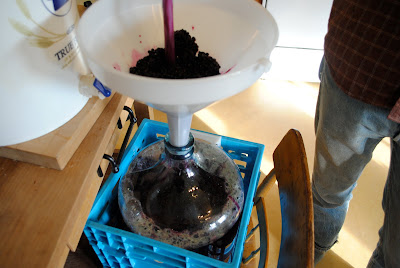Readers of this blog will remember the post in which our harvest of elderberries was detailed. There were three such trips, yielding a total of roughly eight pounds.

But the truth about elderberries is that they taste a bit funny. They are quite tart, with noticeable tannins, and even a little bitterness. Their flavor is so distinct that I cannot think of anything similar enough to mention. I mean, I could say they taste like black cherry, or like melon, or I could get crazy and claim to detect notes of leather or tobacco, but I would just be making things up, and I only do that when I'm tasting wine.
It had been my plan from early on in the harvest to make the elderberries into a mead. Weeks ago Alanna bought twelve pounds of honey and a pack of wine yeast for me at the Little Falls co-op, and I already had the carboys and funnels and airlocks necessary for home fermentation.
I started out attempting to keep everything as sterile as I would for brewing beer. But about half an hour into my preparations I realized that I was going to be dumping a ton of uncooked fruit and honey into the mix, and I stopped worrying about airborne particulates and other such ephemera.
Wine is fermented grape juice, beer is fermented barley sugars, cider is fermented apple juice, and mead is fermented honey. So it makes sense that the quality of the honey in large part determines the quality of the mead. The stuff I used came from a local place, and Alanna, who is much more expert at judging honey quality than I, thought it looked and smelled good.
After mixing it in with about four and a half gallons of water, I pitched the yeast to it and put it into the carboy. Then I set about sludging all the thawed out berries in. They turned the whole thing a ridiculous purple color.
I put on an airlock, and the next morning I was rewarded with a vigorous fermentation.
This is my first attempt at making mead, (or melomel, since it has fruit in it,) and I don't know what to expect. Was not pasteurizing a mistake? Will the elderberries taste crazy? Will the fermentation stick? Is 60 a good fermentation temperature? Will it really need to age a year after primary fermentation if I want it to taste decent? Only time will tell.
-Garth
 I found this visual haiku among the collection of photos I have of the farm. It gave me pause because when I took this photo months ago it felt like a striking condensation of the state of the place. We are approaching the one year anniversary of having purchased the farm and it is amazing to contrast what it feels like to be here now. It is cause for hope and gratitude. I also trust this is only the beginning.
I found this visual haiku among the collection of photos I have of the farm. It gave me pause because when I took this photo months ago it felt like a striking condensation of the state of the place. We are approaching the one year anniversary of having purchased the farm and it is amazing to contrast what it feels like to be here now. It is cause for hope and gratitude. I also trust this is only the beginning. 






